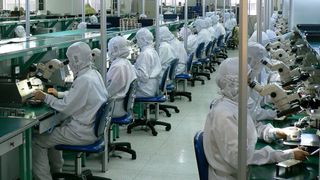Apple, Intel, and Nvidia suppliers in China stop production over power shutdown order
Some plants remain online, for now

Several Chinese suppliers for major tech firms and processor manufacturers like Apple, Intel, Nvidia, and Tesla are seeing their power cut off for several days a month by local government officials in order to comply with a Chinese government directive to cut power consumption in the country to curb carbon emissions.
Eson Precision Engineering, an affiliate of the world's largest iPhone assembly contractor, Foxconn, suspended its production of key mechanical parts for Apple and Tesla at its facilities in the city of Kunshan for six days, starting this past Sunday. The company said this stoppage was a result of the city cutting off electricity supply for industrial use, according to a report in Nikkei Asia.
"The company will leverage its inventory to maintain the operation while production is halted," Eson told the Taiwan Stock Exchange in a recent filing. "We expect to arrange production on the weekends or in the upcoming holidays to meet customers' needs."
- Check out our list of the best smartphones you can get right now
- You can also check out the best MacBook and Macs
- We can also show you how to build a PC, assuming you get all the parts you need
Other major suppliers like Concraft Holding are also going to lean on existing inventory stock to get them through a halt in production, while others like iPhone assembler Pegatron are preparing generators should they receive notice that power is going to be cut off.
The new energy use restrictions come as Beijing is starting to more aggressively crack down on local provincial governments like those in Jiangsu and Zhejiang that fail to meet lower energy consumption targets.
The Chinese government is setting such aggressive power consumption targets in response to several ongoing issues, including a surge in prices for coal and natural gas as well as its efforts to reduce carbon emissions and try to tamp down energy demand that is driving up energy prices.
The effect on major tech suppliers throws another wrench into the gears of the global supply chain, already struggling with a semiconductor shortage and ongoing covid-19 outbreaks in countries like Vietnam and Malaysia, where many technology components are produced to take advantage of low wages and fewer regulatory restrictions.
Get daily insight, inspiration and deals in your inbox
Get the hottest deals available in your inbox plus news, reviews, opinion, analysis and more from the TechRadar team.
Analysis: if we actually want to do something about the climate crisis...
You might think that the recent moves by the Chinese government are a draconian approach to dealing with climate change, and you would be right. These are aggressive steps, but unfortunately, that is the place we find ourselves after spending nearly three decades trying to ignore the problem of climate change.
The most recent UN Intergovernment Panel on Climate Change report, released last month, concludes that 1.5 degrees Celsius of warming in the next two decades is essentially inevitable, since changes in climate are a delayed reaction to past carbon emissions.
Today's climate crisis, from wildfires in the arctic to major flooding in Europe to the depletion of vital aquifers around the world are all consequences of carbon emissions we produced two decades ago, so the next two decades are going to see an acceleration of these crises commensurate with the soaring carbon emissions produced in the past two decades.
It's not like the world didn't know this was happening, its just that major industrialized countries like the US and those in Western Europe did not want to make the changes necessary to prevent it, since that would have meant reducing economic growth and reducing the standard of living for its richest and most influential citizens.
China isn't by any means exempt from this either, but its more aggressive stance towards cutting carbon emissions is pretty much the bare minimum we all need to be doing to make sure that the decades after 2041 won't be as bad as the two decades that preceded them.
If we continue to choose the global supply chain over the climate, the costs of the actions we'll need to take in 20 years to avert catastrophe will make shutting off the power to major industrial centers for a couple of days a month look like a bargain.
- Stay up to date on all the latest tech news with the TechRadar newsletter

John (He/Him) is the Components Editor here at TechRadar and he is also a programmer, gamer, activist, and Brooklyn College alum currently living in Brooklyn, NY.
Named by the CTA as a CES 2020 Media Trailblazer for his science and technology reporting, John specializes in all areas of computer science, including industry news, hardware reviews, PC gaming, as well as general science writing and the social impact of the tech industry.
You can find him online on Threads @johnloeffler.
Currently playing: Baldur's Gate 3 (just like everyone else).
Most Popular

